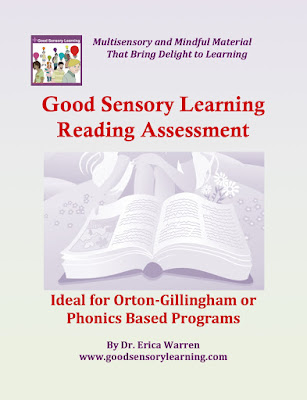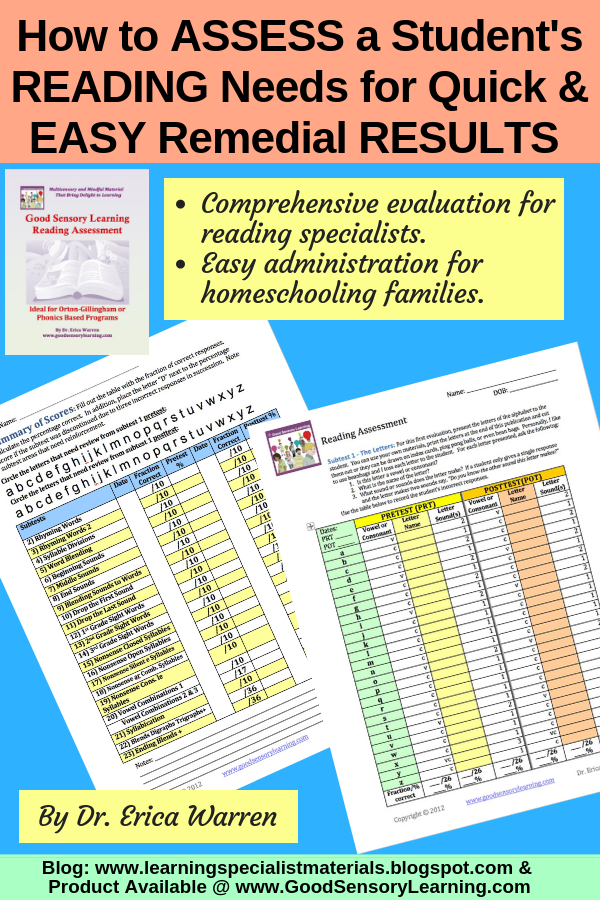This week I wanted to tell you about my online store, Good Sensory Learning. I’m Dr. Erica Warren, and I established this site so I could share all the materials that I have created over the last 20+ years as a learning specialist and educational therapist. When I first began my private practice, Learning to Learn, I had great difficulty finding fun and multisensory materials for my students that were effective and engaging. So back in 2005, I made it my mission to design and distribute high-end, remedial products as well as memorable, motivating lessons that bring delight to learning. If you would like to try a free sampling of my activities , CLICK HERE . How Are the Products Organized at Good Sensory Learning? You can download my Free Printable Catalog or you can browse the site using the grey “search all products” bar in the top right of any page with keywords such as dyslexia, working memory, and executive functioning. What’s more, drop down menus in the red banner allow you t...
Over the years, when I have worked with struggling readers, I have found that they all come with knowledge as well as knowledge gaps. In fact, each student presents their own unique patchwork of knowns and unknowns. I believe that it is my job to quickly evaluate, uncover, and fill the pits an pockets so I can forge a strong foundation and play catchup to a forward bounding curriculum.
Why Should I Assess the Reading Needs of a Struggling Reader?
I have found that no two students have the same strengths and weaknesses. Likewise, struggling readers, even those that come with diagnoses such as dyslexia, all come with a different knowledge base and areas that require instruction and remediation. Unfortunately, many reading programs make all participants go through a lengthy process from square one and progress can be slow and time-consuming. In contrast, evaluating foundational reading skills at the beginning of any program can uncover accomplishments and establish specific needs so that any remedial reading program can be tailored for quick and effective results. What's more, repeating the assessment after an intervention can help define new proficiencies as well as continued areas that require attention.
Finding a Simple Assessment that Covers All the Foundational Reading Skills is Hard to Find
 Although there are many reading assessments that are available, they are often geared toward general reading skills such as reading speed and reading comprehension. Although this information is helpful, it does not define an appropriate remedial approach. The Good Sensory Learning Assessment offers teachers, reading specialists and parents a simple evaluation instrument that helps guide instruction so remedial needs can be targeted. It offers a comprehensive selection of subtests that can be used to measure student abilities with: letter names and sounds, rhyming words, syllable divisions, word blending, beginning sounds, middle sounds, ending sounds, blending sounds to words, dropping the first sound, dropping the last sound, 1st grade sight words, 2nd grade sight words, 3rd grade sight words, nonsense closed syllables, nonsense open syllables, nonsense silent e syllables, nonsense r-combination syllables, nonsense consonant le syllables, vowel combinations, syllabication, blends, digraphs and trigraphs, ending blends, compound words, prefixes, suffixes, and multisyllabic words. It's a comprehensive tool that can be used in entirety or subtests can be select for a more focused approach.
Although there are many reading assessments that are available, they are often geared toward general reading skills such as reading speed and reading comprehension. Although this information is helpful, it does not define an appropriate remedial approach. The Good Sensory Learning Assessment offers teachers, reading specialists and parents a simple evaluation instrument that helps guide instruction so remedial needs can be targeted. It offers a comprehensive selection of subtests that can be used to measure student abilities with: letter names and sounds, rhyming words, syllable divisions, word blending, beginning sounds, middle sounds, ending sounds, blending sounds to words, dropping the first sound, dropping the last sound, 1st grade sight words, 2nd grade sight words, 3rd grade sight words, nonsense closed syllables, nonsense open syllables, nonsense silent e syllables, nonsense r-combination syllables, nonsense consonant le syllables, vowel combinations, syllabication, blends, digraphs and trigraphs, ending blends, compound words, prefixes, suffixes, and multisyllabic words. It's a comprehensive tool that can be used in entirety or subtests can be select for a more focused approach.
What are Homeschooling Parents and Reading Teachers Saying About The Good Sensory Reading Assessment?
Cheers, Erica
Dr. Erica Warren is the author, illustrator, and publisher of multisensory educational materials at Good Sensory Learning and Dyslexia Materials. She is also the director of Learning to Learn and Learning Specialist Courses.
Why Should I Assess the Reading Needs of a Struggling Reader?
I have found that no two students have the same strengths and weaknesses. Likewise, struggling readers, even those that come with diagnoses such as dyslexia, all come with a different knowledge base and areas that require instruction and remediation. Unfortunately, many reading programs make all participants go through a lengthy process from square one and progress can be slow and time-consuming. In contrast, evaluating foundational reading skills at the beginning of any program can uncover accomplishments and establish specific needs so that any remedial reading program can be tailored for quick and effective results. What's more, repeating the assessment after an intervention can help define new proficiencies as well as continued areas that require attention.
Finding a Simple Assessment that Covers All the Foundational Reading Skills is Hard to Find
 Although there are many reading assessments that are available, they are often geared toward general reading skills such as reading speed and reading comprehension. Although this information is helpful, it does not define an appropriate remedial approach. The Good Sensory Learning Assessment offers teachers, reading specialists and parents a simple evaluation instrument that helps guide instruction so remedial needs can be targeted. It offers a comprehensive selection of subtests that can be used to measure student abilities with: letter names and sounds, rhyming words, syllable divisions, word blending, beginning sounds, middle sounds, ending sounds, blending sounds to words, dropping the first sound, dropping the last sound, 1st grade sight words, 2nd grade sight words, 3rd grade sight words, nonsense closed syllables, nonsense open syllables, nonsense silent e syllables, nonsense r-combination syllables, nonsense consonant le syllables, vowel combinations, syllabication, blends, digraphs and trigraphs, ending blends, compound words, prefixes, suffixes, and multisyllabic words. It's a comprehensive tool that can be used in entirety or subtests can be select for a more focused approach.
Although there are many reading assessments that are available, they are often geared toward general reading skills such as reading speed and reading comprehension. Although this information is helpful, it does not define an appropriate remedial approach. The Good Sensory Learning Assessment offers teachers, reading specialists and parents a simple evaluation instrument that helps guide instruction so remedial needs can be targeted. It offers a comprehensive selection of subtests that can be used to measure student abilities with: letter names and sounds, rhyming words, syllable divisions, word blending, beginning sounds, middle sounds, ending sounds, blending sounds to words, dropping the first sound, dropping the last sound, 1st grade sight words, 2nd grade sight words, 3rd grade sight words, nonsense closed syllables, nonsense open syllables, nonsense silent e syllables, nonsense r-combination syllables, nonsense consonant le syllables, vowel combinations, syllabication, blends, digraphs and trigraphs, ending blends, compound words, prefixes, suffixes, and multisyllabic words. It's a comprehensive tool that can be used in entirety or subtests can be select for a more focused approach.What are Homeschooling Parents and Reading Teachers Saying About The Good Sensory Reading Assessment?
- "This is awesome! I am always looking for something to use to assess various phonological skills, and this is wonderful! It covers everything in one well-organized package. Wow! I wish I had found it a long time ago."
- "I have been looking for an assessment like this, so finding it was a great delight."
- "Great for my use with children who haven't yet been identified with dyslexia. I use it as a screening tool prior to beginning tutoring with different Orton-Gillingham-based reading systems."
- "BEST...RESOURCE...EVER! So targeted! My go-to assessment."
Cheers, Erica
Dr. Erica Warren is the author, illustrator, and publisher of multisensory educational materials at Good Sensory Learning and Dyslexia Materials. She is also the director of Learning to Learn and Learning Specialist Courses.
· YouTube Channel: https://www.youtube.com/user/warrenerica1
· Podcast: https://godyslexia.com/
· Courses: http://www.learningspecialistcourses.com/
· Newsletter Sign-up: https://app.convertkit.com/landing_pages/69400

Comments
Post a Comment